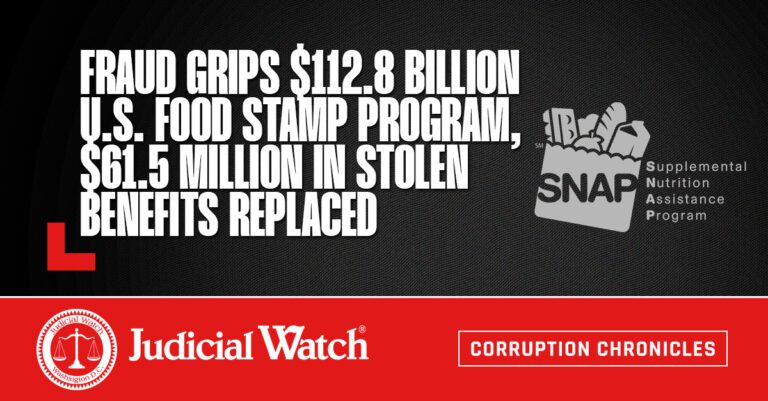

Fraud Grips $112.8 Billion U.S. Food Stamp Program, $61.5 Million in Stolen Benefits Replaced


Fraud in the government’s food stamp program is so pervasive that the U.S. Department of Agriculture (USDA), the agency that administers it, launched a special system to facilitate the replacement of the welfare benefit when recipients claim it stolen. In the two years since the Biden administration created the program, the government has doled out a hefty $61.5 million to replace pilfered food stamps—rebranded Supplemental Nutrition Assistance Program (SNAP) by the Obama administration to eliminate stigma—in 127,290 cases. Keep in mind, this is in addition to the staggering $112.8 billion that Uncle Sam spends to provide 42.1 million with free groceries, according to the latest government figures.
The USDA’s SNAP Replacement of Stolen Benefits Dashboard reveals that 79% of claims were approved by the agency and that 339,269 fraudulent transactions were identified through approved stolen benefits claims. Recipients in every state in the nation have submitted claims and New York has by far the most food stamp fraud cases—50,678. Maryland is second with 33,509, followed by Illinois (16,369), Texas (11,633), Washington State (4,208), New Jersey (3,630), Arizona (3,541), North Carolina (3,434), Indiana (3,309) and New Mexico (3,027). Three states have reported over 2,000 cases and more than half a dozen have over 1,000. The federal government allows states to replace benefits stolen as far back as October 2022, according to the USDA dashboard.
“The United States Department of Agriculture (USDA) is aware of increased reports of Electronic Benefit Transfer (EBT) theft due to card skimming, cloning, and similar fraudulent methods,” the agency announced in January 2023, revealing that at the end of 2022 President Biden signed a measure that includes a provision for the replacement of stolen food stamp benefits with federal funds. The USDA cites the section of the law that requires it to issue guidance to state agencies and “promulgate regulations to protect and replace SNAP benefits stolen via card skimming, card cloning, and other similar fraudulent methods.” Other similar fraudulent methods may include, but are not limited to, scamming through deceitful phone calls or text messaging that mimics official state agency messaging and phishing. “A theft that resulted from any of these methods would be eligible for replacement,” according to the USDA.
Rather than so easily replacing the stolen benefit, perhaps the government should create a system to crack down on the rampant fraud. Besides saving American taxpayers tens of millions of dollars, it seems like a more efficient way to operate. Afterall, the nation’s bloated food stamp program has long been plagued by problems that have fleeced the system out of large sums. A few years ago, the USDA disclosed that it sees over a billion dollars annually in food stamp fraud. Many of the retailers authorized by the government to accept food stamps also engage in illegal practices, the agency has found. A few years ago, nearly 200 people were arrested in Florida for operating a sophisticated ring in which 22,000 fraudulent food stamp transactions totaling $3.7 million were recorded by a task force of local and federal authorities. In 2016 the feds busted the largest food stamp fraud operation in history, a $13 million scheme run by flea market retailers in the largely black and Hispanic areas of south Florida’s Miami-Dade County known as Opa-Locka and Hialeah.
The government has failed to mitigate the illicit activities that have long plagued the program and now it is doling out tens of millions of dollars to replace stolen benefits rather than implement a system to prevent it. Just a few weeks ago, a Kentucky news station reported that thieves have stolen more than $5 million worth of food stamps in the past year from families in Kentucky and Indiana. “Scammers are draining accounts linked to EBT cards,” used by the government to distribute benefits, the story says. In South Carolina a woman recently got busted for fraudulently receiving more than $28,000 in food stamp benefits. Another woman was also recently arrested in the state for fraud after taking over $12,000 in food stamps that she did not qualify for. In Delaware and Tennessee, the government recently replaced hundreds of thousands of dollars in stolen food stamps, according to local news reports. The list goes on and on.















